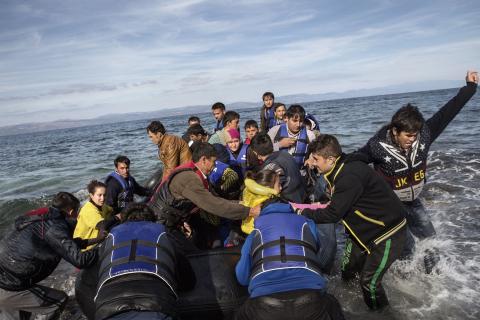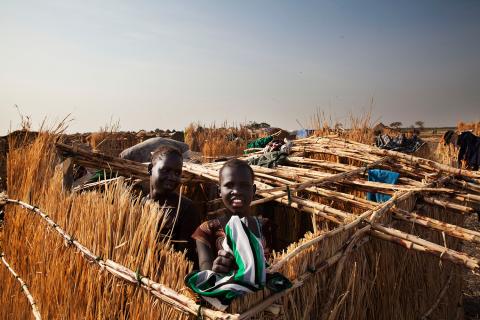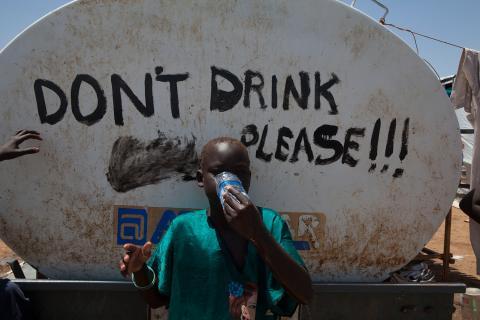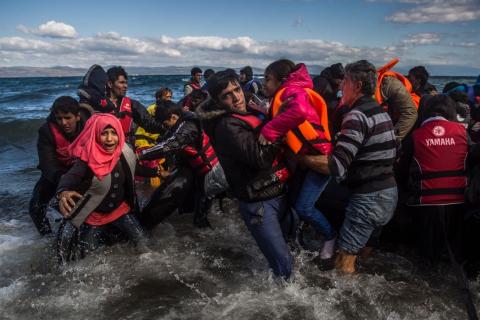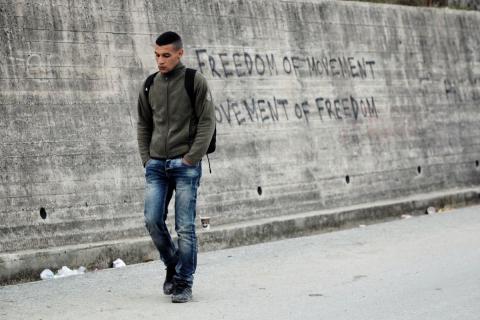The Message
Below are a few essays and photographs that appeared with the music released for Refugio del Sonido.
Sound in Motion | Javier Limón, artistic director, Mediterranean Music Institute
Over the course of many years, when slavery took Africans to America, the music and sounds they brought with them mixed with indigenous and colonial people to create the most important styles of Western music. Blues, jazz, Afro-Cuban music, and several other styles emerged from their journey. The same happens in the Mediterranean where, for many centuries, music traveled through cultures such as those of the Jewish, Roman, Greek, and Persian people. Now is our time to take responsibility as part of the history of this wonderful tradition.
Sound is the only thing that people take when they have to leave. They say that a true journey is the one that doesn’t have a return ticket. Millions of people have left their homes, their landscapes, cuisine—everything—to run away in search of a better life. They are knocking on our doors and our moral obligation and ethic should be enough to open it and share the same table. We shouldn’t forget that the best thing a society can receive is change.
The people who are asking us to walk together during upcoming years are a like fresh gulp of water for our culture. Kids who are now coming from Syria, Somalia, or Afghanistan will become the men and women who lead the evolution of our art in the future. If our history is marked by the influence of many cultures who, in their passage, left the best of themselves, our future should be marked as well because our roots are still alive and will continue to harvest in the future.
In this project, Refugio del Sonido (Refuge of Sound), some of the most important and intellectual voices of our time launch a dialogue to expand our vision of the tragedies of the Mediterranean refugees and others around the world. These voices bring together musicians from many countries in an artistic plea that claims this problem as our own. Everything that happens today in the world looks so accelerated, global, and diverse that we all are, or will be some day, refugees.
Anna Surinyach
Taking Action | Matthew Nicholl, executive director, Mediterranean Music Institute
The diaspora of peoples from Northern Africa and the Middle East through the Mediterranean and Europe is one of the greatest tragedies of our time. Millions of souls are fleeing, seeking refuge—and too often finding none. Given the scope and locus of the tragedy, the Mediterranean Music Institute of Berklee College of Music acted in the only way we could: through music.
Javier Limón, MMI artistic director, in partnership with El País and Doctors Without Borders, was inspired to create Refuge of Sound as a message to the world that we can’t look away, but must actually look more deeply. Javier’s songs, sung and played by Berklee students from all over the world, signal that within the great diversity of our world, all lives are equally valuable and we share a common theme within our hearts.
The road the refugee walks is a hard one—a stone against breaking waves. There is no refuge here, only endless footsteps and a desperate hope of arrival. In deepest truth, aren’t we all walking this road, seeking to finally come home? Look there, on the path, isn’t that your brother? And stumbling there, clutching a doll, is that your child?
Please join us in our symphony of songs as we raise our voices to sing our people home.
Sudan Anna Surinyach
"One-Way Chicken" | Roger H. Brown, president, Berklee
Imagine that you arrive home, and someone—your father, mother, son, daughter, or cousin—tells you to pack a small backpack. You are evacuating immediately. You are at risk. Your entire family will leave; wander on foot to a neighboring country, board a small boat, climb a mountain range, or cross a desert and hope to avoid being captured, interrogated, and tortured by government soldiers, informal militias, or invading armies.
Do you refuse to go? What do you pack? Money and valuables run the risk of being stolen, but do you leave them behind knowing you may never see your home again?
While their circumstances are wildly different, all refugees have made a common but momentous choice—between remaining where they are and fleeing to an unknown future in an unknown place. They pray, hope, and believe that the unknown will be better.
I spent several years working with refugee populations, first on the border of Cambodia and Thailand after the Khmer Rouge reign of terror ended, and next in Sudan, where thousands of Ethiopians and Eritreans fled famine. More recently, my wife, Linda Mason, has been working with Congolese and Syrian refugees and displaced people.
Refugees often end up in dense, unplanned settlements where poor sanitation, disease, and thuggery are constant threats. Through my work I realized that these unfortunate circumstances reveal some practical truths. Securing water and shelter are the absolute, most essential daily obsessions; and jewelry, gold, and gems have value even when currencies collapse—a family heirloom is often more precious when used to pay off border patrol or a smuggler than as adornment.
One of the most startling observations I made was that despite the traumatic shock of becoming a refugee—the daily struggles to survive, the indignities, the sense of loss and hopelessness—music becomes the most portable and important part of a refugee’s culture. In the Cambodian refugee camps, Thai black markets supplied inexpensive boom boxes that became ubiquitous. During my time there a German band with Caribbean roots called Boney M was at the height of popularity and its song “One Way Ticket (to the Moon)” was among the hits. I remember several refugee friends thought the lyric was “One Way Chicken” and asked me, in all seriousness, to explain the meaning of a “one-way chicken.” Music of all kinds was played everywhere, but it was the resurgence of traditional Khmer folk music that one heard most often: sounds of home and of a peaceful life long passed.
And as we’ve seen with the diaspora of African slaves to Brazil, the Caribbean, and the U.S.; the Roma throughout Europe; and Celtic populations to North America, entirely new musical forms are born of displacement. Music travels the most dangerous roads and evolves to express both the darkness and light of the experience.
Through the enclosed recording, talented Berklee students have drawn from their family histories (most of us descend from refugees of one sort or another) and employed their empathy to create a musical tribute to express our sisterhood and brotherhood with refugees around the world. May we all listen to these sounds of home, and imagine a peaceful future for all for all those who are displaced.
Sudan Anna Surinyach
Where Do We Go From Here? | Christian Karam '03, musician/activist
Packed bags, passports, a change of clothes, sandwiches, water. By the door, at all times. Never knew when we’d have to run.
That was my entire childhood, in war-torn Beirut. I come from a long lineage of conflict and migration. My Armenian grandparents were refugees, and many people from my family still are. From being persecuted and deported during the Armenian genocide to having to flee during the Lebanese civil war, which involved occupation by, and armed conflict with, every neighboring military group inside and outside the country. From finding safety in the United States and having that illusion shattered in the wake of 9/11, to being one block away from the Boston Marathon bombing in 2013.
What I learned very early on is that everywhere in the world, it's the same fears that perpetuate the same patterns, which are then projected and displaced from people to people, from generation to generation, from one religious group to another religious group. It's ironic that we feel we need to identify an enemy so we can feel safer within the walls we have built around our own communities. When did we learn that it was safer to fear than to love? When did we forget that we are all in this together? That when we hurt someone else, we are only hurting and isolating ourselves?
War is just a symptom of terror: the terror we all have of not belonging, of not being loved, of not having enough. We have all participated and continue to participate in creating the world we live in today. By our actions and, more often than not, by our inactions. Not choosing is, after all, choosing.
What is it that we keep missing? What is it in the eyes of the other that we fail to recognize? Could it be that the same tragedies will continue to befall humankind until we are able to respond to them from a place other than that which created them? Could it be that the answer was within us all along? Could it be that if we each took responsibility for our fears, there would be much less need for violence?
I firmly believe that the day enough people commit to creating a different world, we will live in a different world. And people will commit only when they are less afraid to care, when they feel safe, when they are more informed, and when they can trust in our human connection. Music, because it is vibration, has the power to take us deeper and bring us closer to that connection so we can slowly but surely begin the work. I am truly privileged to be an artist but also feel a big responsibility to use my voice wisely. I know all too well it can change lives.
After generation upon generation of fleeing and not belonging, and my own healing journey, I have understood this: the only place to go from here is inward. When one is uprooted, one can no longer hold on to the illusion of a geographical home. Home has to become the soul itself. It can be a long time coming, but from there, we can go anywhere.
Santi Palacios
Artistry and Social Change | Layth Al-Rubaye '14, violinist
Born in Iraq and raised in Jordan, I was very lucky to grow up in a musical environment and to have had the support and training that has helped me reach this level in my musical life and career. But somehow all this time it has always been about me and about what I want to do, and I really think that I missed the point of my real purpose in this life. As a musician and an artist, I feel it is my duty to become an ambassador for my country and culture and to always portray it in the best way possible, to bring understanding and unity to different sides of the globe.
While growing up in Jordan, I never felt that I was not welcome, thanks to my parents and to a community that really embraced us and offered us many opportunities that led me to being the person I am today. But the reality of the refugee crisis has been a companion to the Middle Eastern story for as long as I can remember. It has destroyed the lives of families and has brought heartbreak and hurt to many, and it saddens me to see these simple people facing all these hardships that they never brought unto themselves.
A year ago I was flying back to Jordan and I was thinking about how lucky I was to have a home to return to, and about the countless people around the world who don’t have that option anymore because they lost their homes and lands.
The world today is crazy place; there is so much division, hatred, racism, and inequality. We are all social networkers yet there is nothing social about our lives, and especially when it comes to the recent refugee crisis.
It’s sad to see all the families leaving their homes and countries in search of hope and safety while always being pushed out and neglected. I think this happens because in the world today we often look at our differences rather than our similarities. A few nights ago I was sharing the stage at the Kennedy Center with colleagues who come from five different countries. Even though we all speak different native tongues and come from different backgrounds, on that stage we had one mission, to sound like one—in music—because music promotes a common instinct to look for the similarities in each other, both on stage and off it.
Music is such a powerful tool because it has the power of speaking directly to people’s hearts and to direct their emotions. It is even proven that music has the power to literally change people’s brains, so why not use music and artistry as a tool for social change and cultural diversity?
We, as musicians and artists, have the power to share these experiences with the world and show that it is possible to have different skins, different religions, and different points of view, but we all have one mission in this life, and it is humanity.
We do this in the hope that our art can influence people in higher positions to look at situations differently, to make decisions out of love, not out of fear and to look for similarities in each other instead of differences.
I leave you with these questions: What does it mean to be an artist? Is it a profession? Or is it a mission?
Claudio Ålvarez
